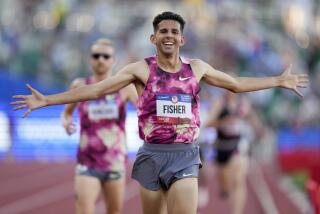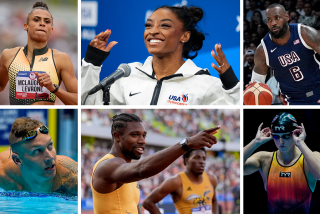IT’S ANYBODY’S RACE : U.S. Olympic Men’s Marathon Trial Has at Least 21 Contenders, Pfitzinger Says
- Share via
JERSEY CITY, N.J. — It has been at least five years since an American male has dominated marathoning. That man, Alberto Salazar, is now semi-retired from running and devoting most of his time to the Oregon Electric Station, the restaurant he owns in Eugene, Ore.
As a result, the Olympic men’s marathon trial here today--which will select the three American men who will race the 26.2-mile distance at Seoul, South Korea, this fall--is shaping up as virtually anyone’s race.
“The three who make the team will be those who roll out of bed on the right side that morning,” said Pete Pfitzinger, who daringly broke away from the pack midway through the 1984 trial in Buffalo, N.Y., was caught by Salazar in the final mile--and then astounded everyone by coming back to sprint past Salazar to the finish.
“I went through the list the other day and there were 21 I’d put in the ‘A’ category, who have a good chance of making the team,” Pfitzinger added. “I was talking about that with someone the other day who said, ‘No one would have put you in the ‘A’ category in 1984.’ So, I guess you have to worry about the ‘B’ category too.”
Or as Joe Henderson, the unofficial dean of running commentators, put it: “Never have so many men had real shots at the three spots. You could toss 25 names in the air, pick up any three from the floor, and they would all have an equal chance.”
Pfitzinger, who placed 11th and was the first American finisher in the 1984 Olympic Marathon in Los Angeles, will try to make his second Olympic team today. But he plans no reckless moves this year.
“I could afford to do what I did in 1984, because I wasn’t expected to make the team--I could give it my best shot,” he said. “This time, I consider myself a legitimate contender, and I would tend to be less daring. There’s a whole bunch of guys, any of whom will make it quite honest. I’d just as soon it be a good, hard pace--but without me leading.”
If there is a single frontrunner in today’s race, it will most likely be Pat Petersen, a financial analyst from Ronkonkoma, N.Y., who went out front early in last fall’s New York City Marathon and ran alone for about 15 miles. Although he was eventually overtaken, he finished a solid fourth.
“When I get into a big race like this, I get wired,” Petersen said. “If I feel the pace is too slow for me, I’m not going to be intimidated by feeling I have to stay with the other runners. Most are afraid to put it on the line early.”
He added: “The worst thing in the world is being in a pack of 30 or 40 runners and having everyone bumping into one another”--a tactic similar to that employed by the group that ran behind Pfitzinger in 1984--”And I have no patience. It’s just not going to be a slow pace. And it won’t be strategic--not with me.”
The course is a tough one--hilly and often windy--run along the New Jersey waterfront, across the Hudson River from Manhattan. The race will begin for Olympic hopefuls at 1 p.m. (EST), with other runners starting 15 minutes later. The late start could mean extremely warm conditions, less than ideal for running a marathon.
“I know this course,” Petersen said. “I’ve been training on it for 10 weeks on Sundays. It’s very hilly, and it’s brutal between miles 10 and 19. I can’t go out quite the way I did in New York”--referring to an early pace that brought him to the half in a very swift 1 hour 3 minutes--”But I run well in the heat. In fact, I tend to go better against the field when the conditions are sub-par.”
If running the course previously helps, then Bill Donakowski, of El Cerrito, has a distinct advantage. Donakowski, the fastest qualifier with a time of 2 hours 10 minutes 41 seconds, has run the race twice, winning it in 1986.
Donakowski, an engineer for the University of California, was injured most of 1987 and hasn’t run a marathon in a year. But he said he has recovered and that his training has gone well.
“I feel fine and I think I’m ready,” he said, adding that “I hope someone goes” in the final miles, “because it can get kind of sloppy with a pack of 15.”
Donakowski said he has had sufficient time to train, despite the demands of his work. He is one of only a few top runners to hold a fulltime job. Petersen’s employer, the Grumman Corp., agreed to reduce his work day to enable him to train, but Donakowski said he does not need the additional hours.
“I feel you should balance your life,” he said, adding that if he had more free time, “I’d probably take more naps and watch more daytime television.”
Don Kardong, who finished fourth in the 1976 Olympic marathon in Montreal--and who, as a former Olympian has been given an entry into today’s race--called Donakowski his top pick.
“He is a clever runner, and in a race like the trials, clever is what counts,” Kardong said. “Clever means knowing how to read your competition, and knowing where you should be at any point in a race.”
Kardong, who missed a bronze medal in 1976 by three seconds, said he hoped to run in the mid-2:20s today.
“I’ve trained harder than I’ve trained in the last five or six years, mostly out of terror,” he said. “I don’t want to be the last finisher.”
Among the other contenders in today’s marathon are Greg Meyer, Dave Gordon, Don Janicki and Don Norman.
“Greg Meyer and Dave Gordon are in the best shape they’ve been in in years,” said Bob Sevene, who coaches both men. “David’s the most ready he’s ever been. He’s in a funny place mentally. He borders on cocky. I think they’re both very fit.”
Meyer said he has had nine solid months of training and felt confident because “there’s no pressure on me this year--not like in ’84.”
Janicki and Norman are equally confident.
“I really feel like I’m good enough to be on that team, but there are so many unknowns,” Janicki said. “Basically, it comes down to that day and who’s hot on that day. But I’m going to scratch and claw my way in--I want it that bad.”
Norman, who has a best of 2:11:08, said he has quit drinking and improved his diet, shedding 12 pounds in the process. “People knew I was serious when I gave up beer.”
More to Read
Go beyond the scoreboard
Get the latest on L.A.'s teams in the daily Sports Report newsletter.
You may occasionally receive promotional content from the Los Angeles Times.






